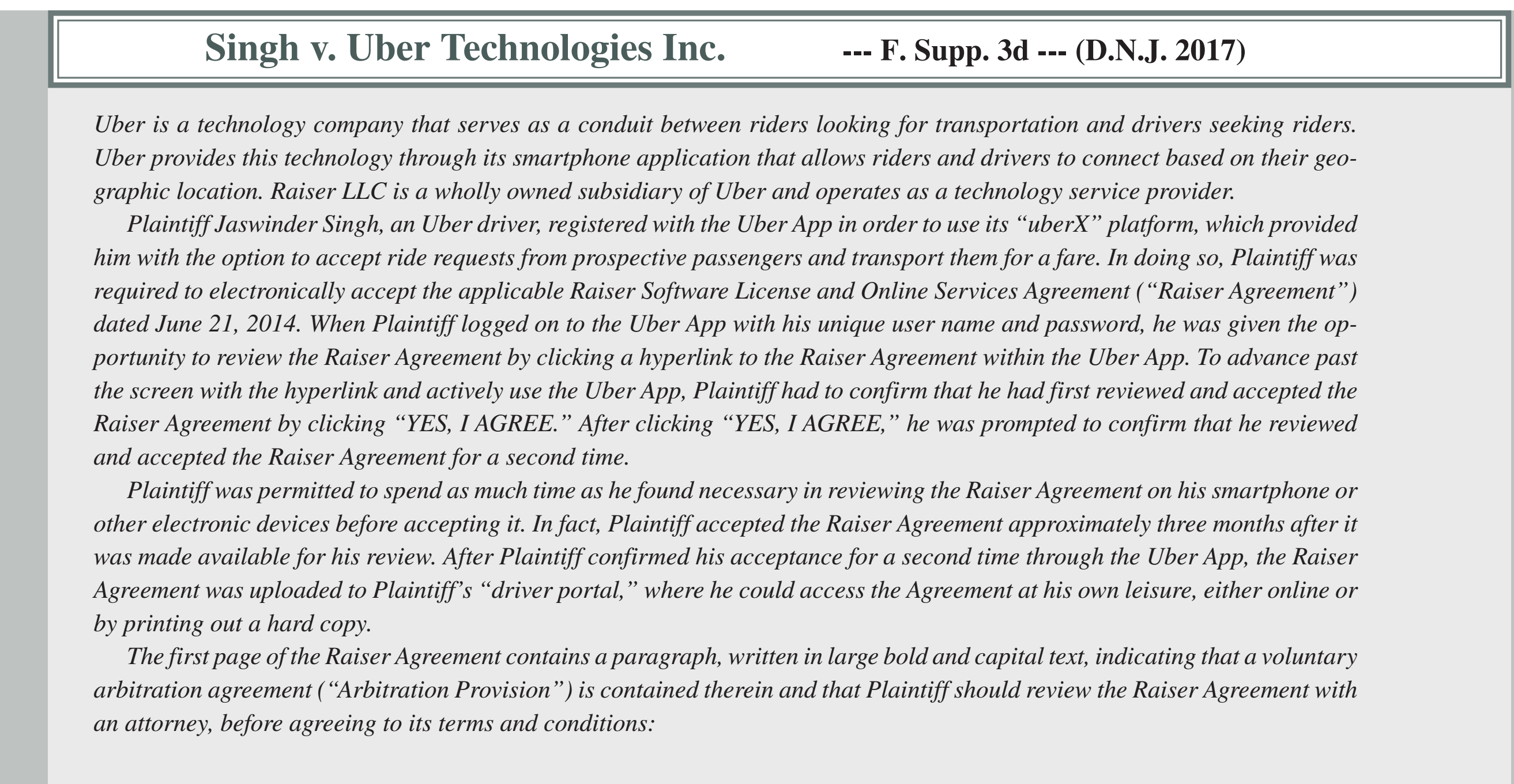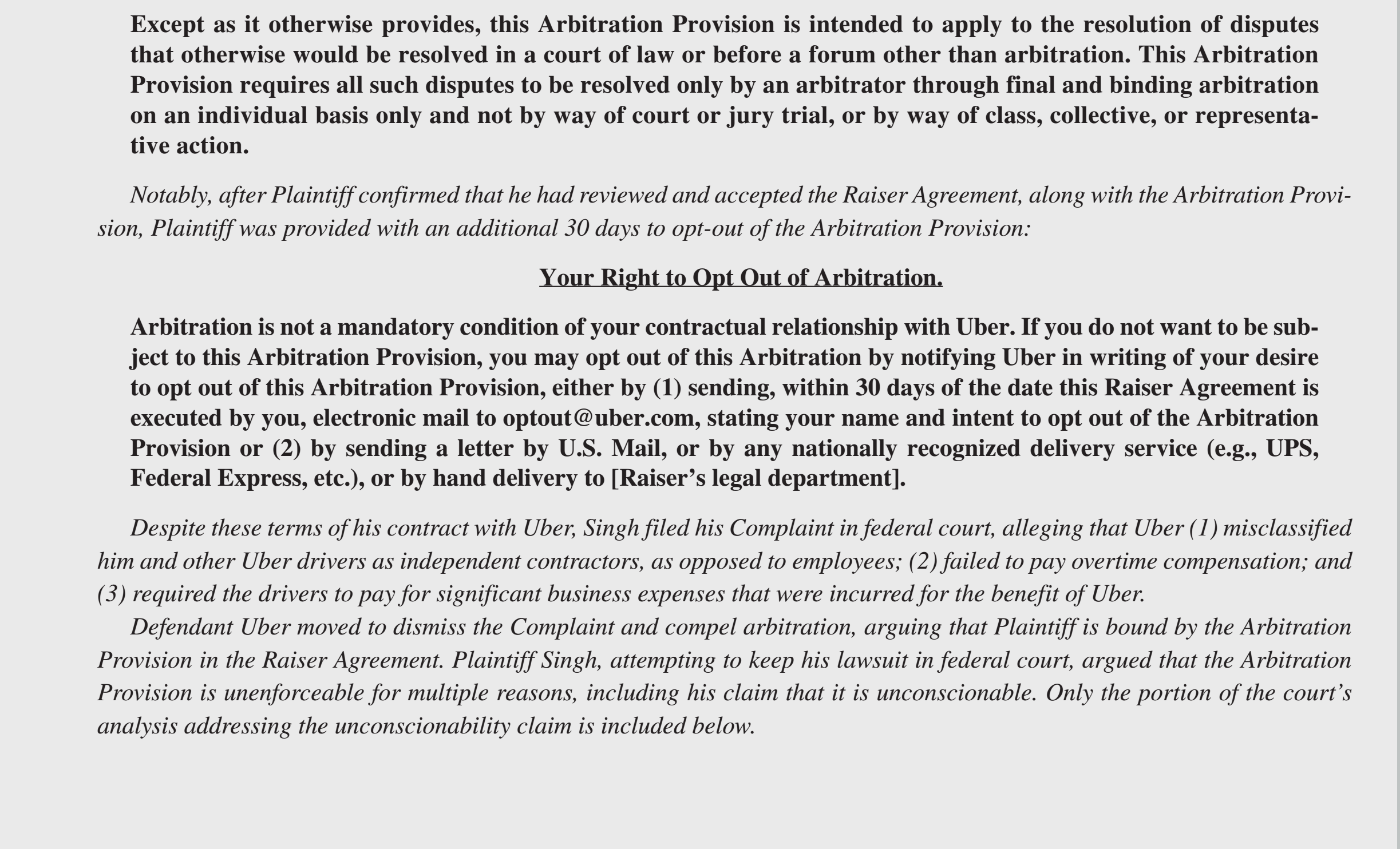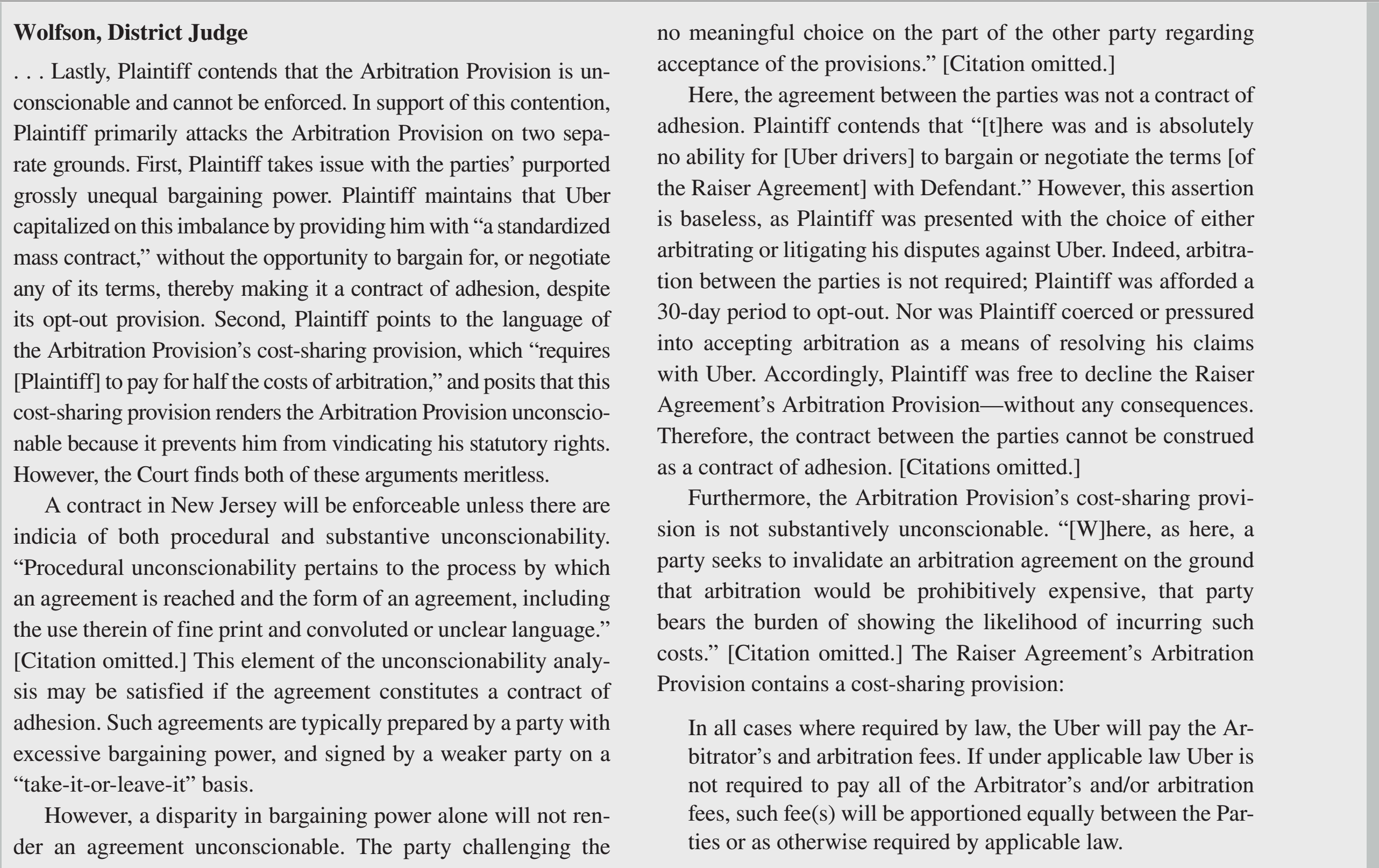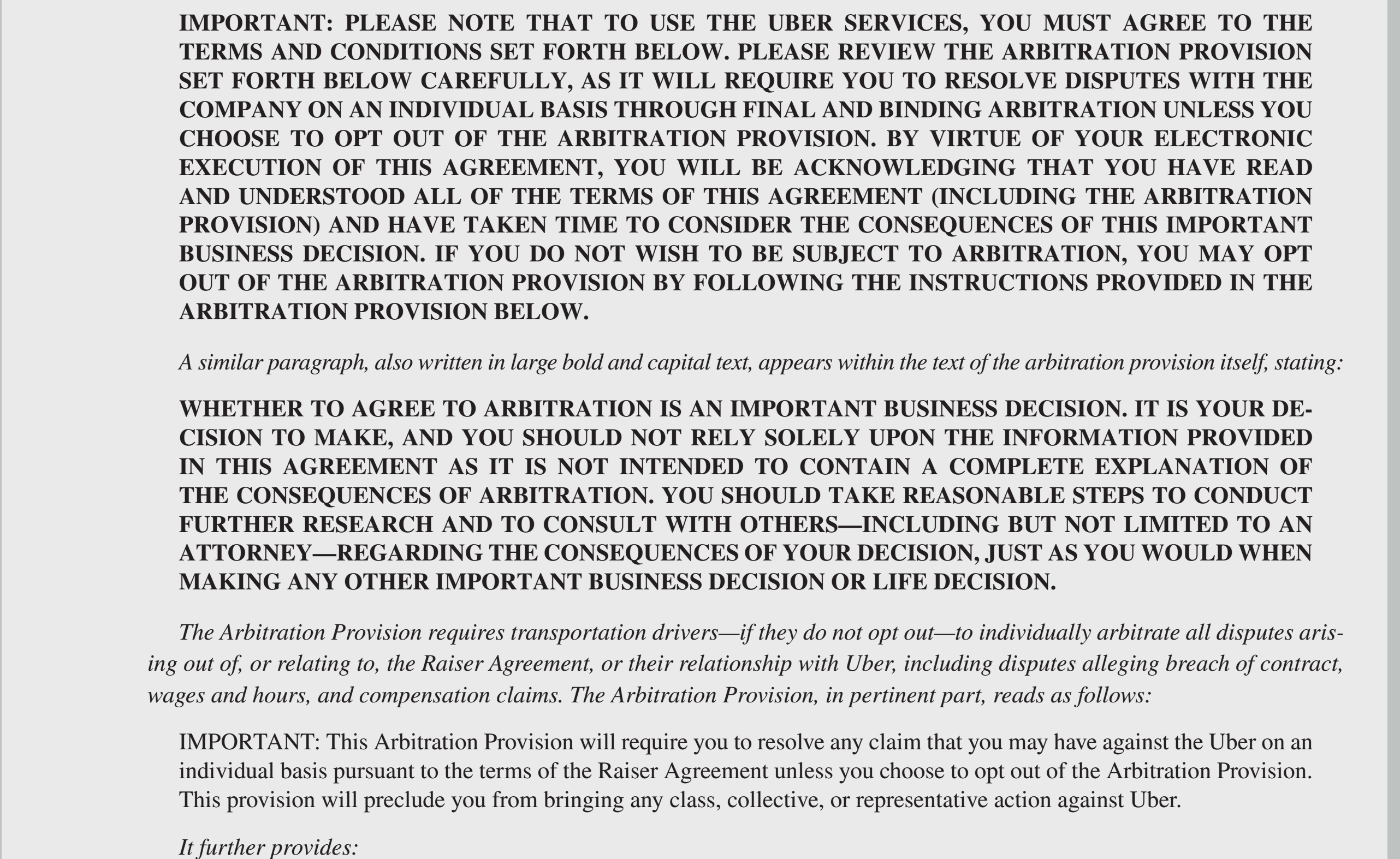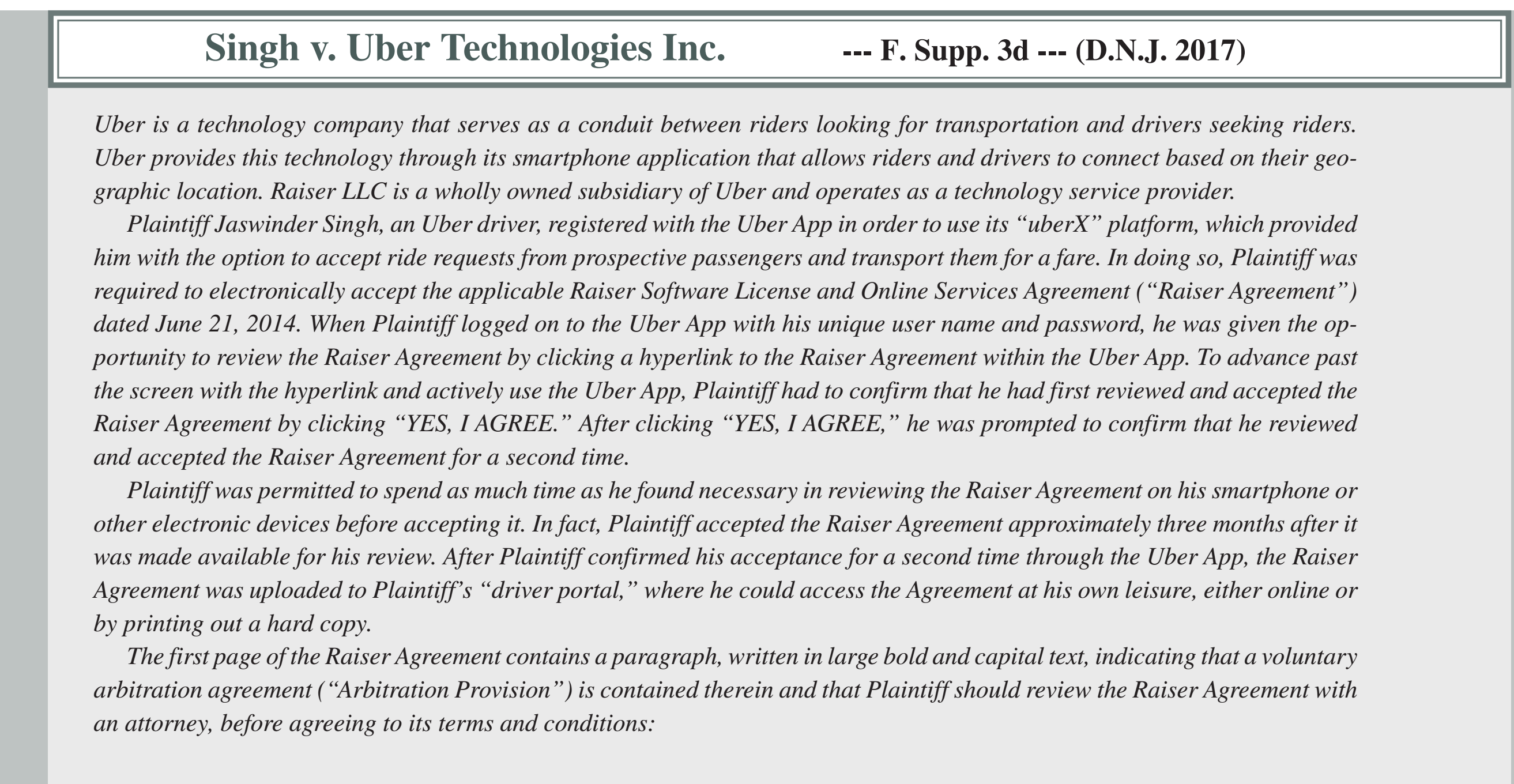
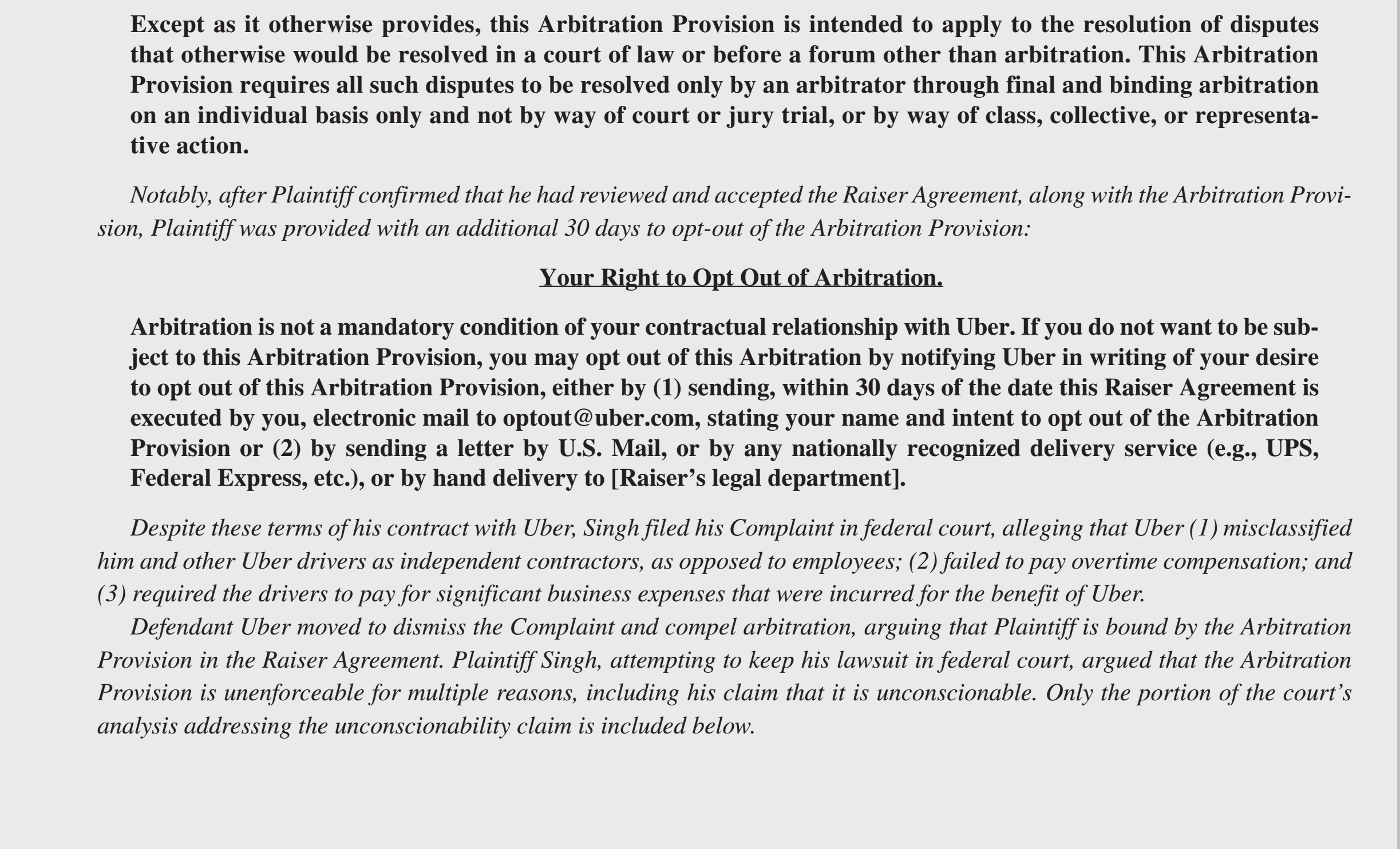
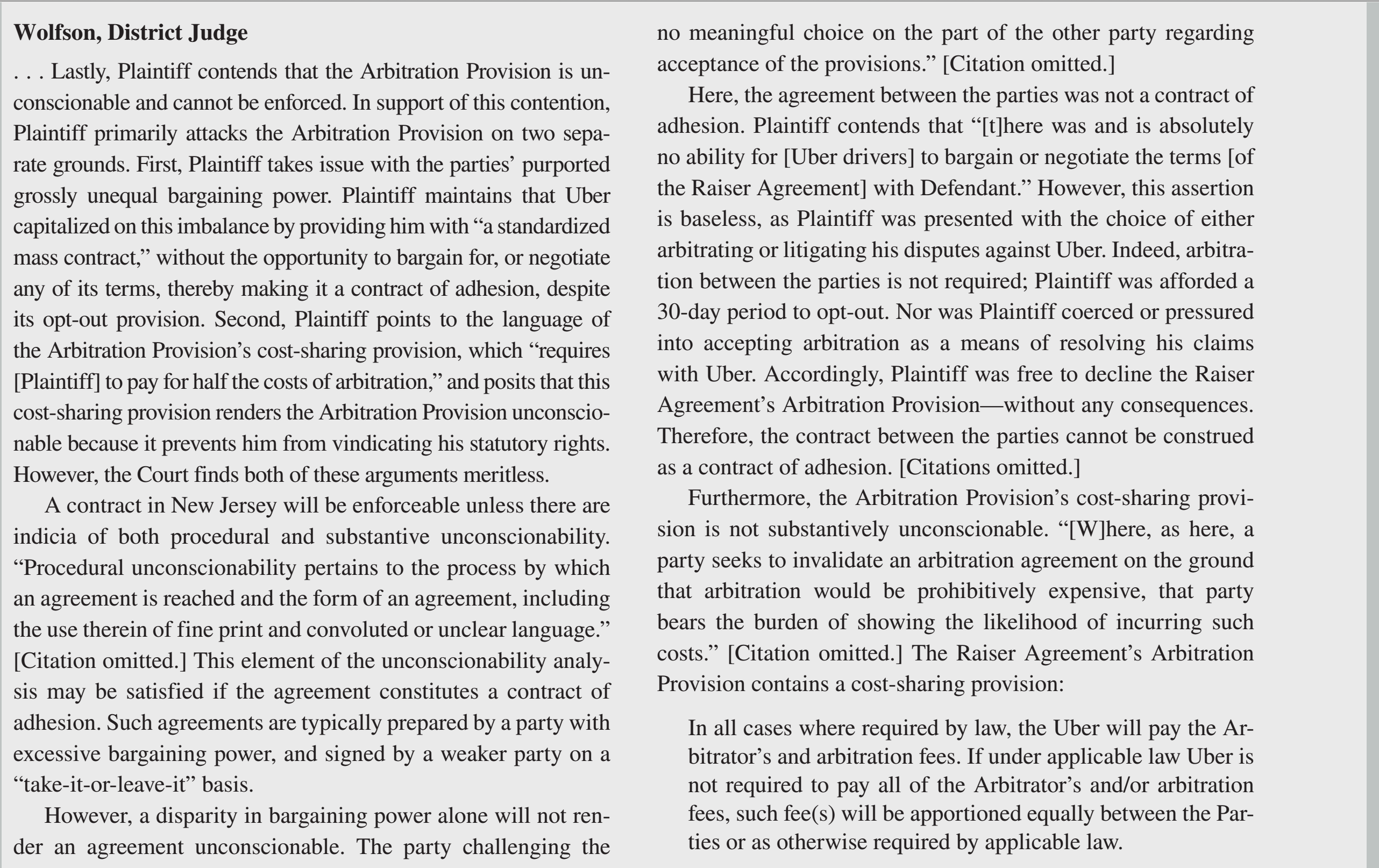

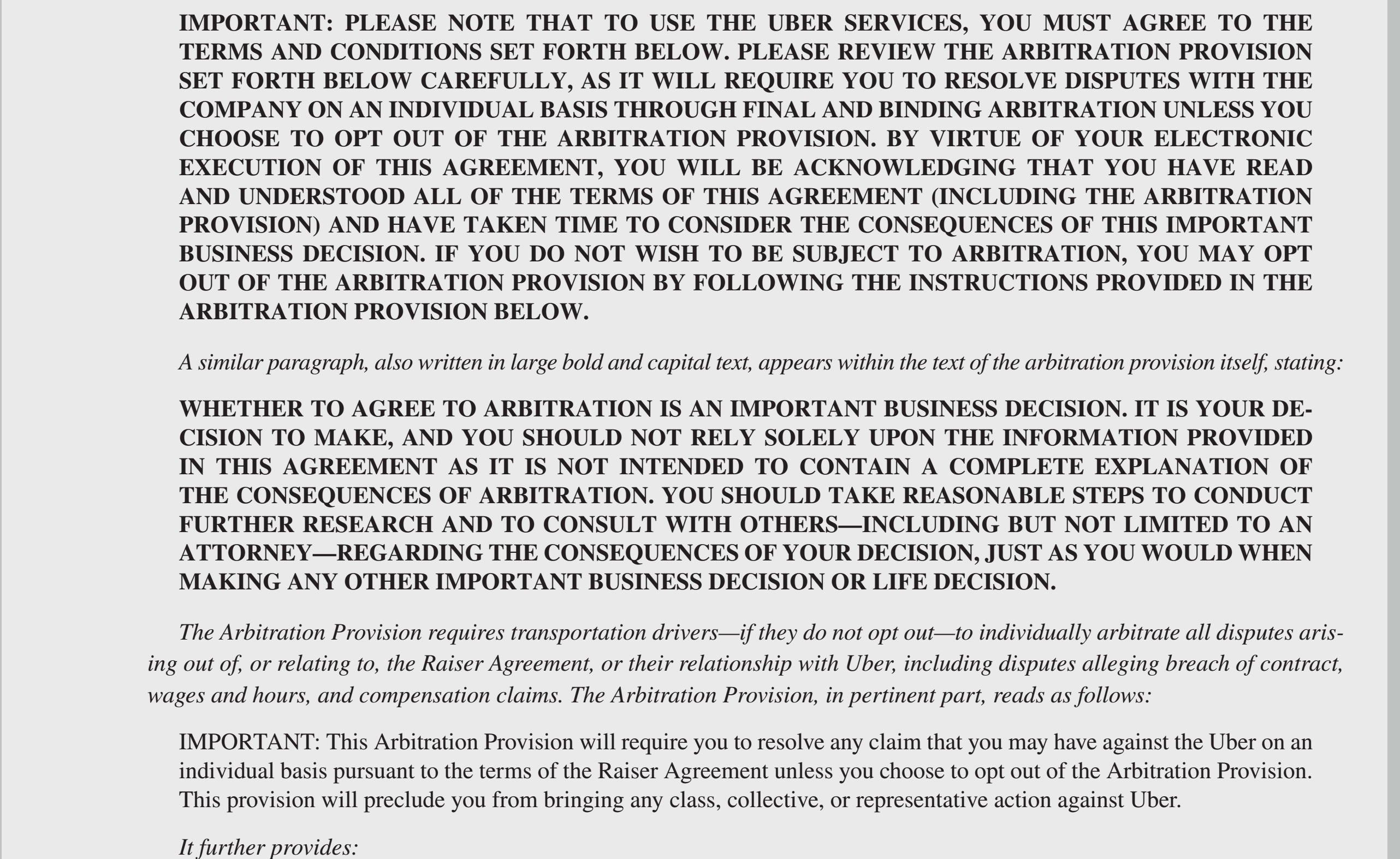
This is the case of Singh v. Uber Technologies inc.
Question: include
the following;
Fact:
Judgment:
Issue:
Holding:
General Analysis
Applied Analysis:
Singh v. Uber Technologies Inc. F. Supp. 3d (D.N.J. 2017) Uber is a technology company that serves as a conduit between riders looking for transportation and drivers seeking riders. Uber provides this technology through its smartphone application that allows riders and drivers to connect based on their geo- graphic location. Raiser LLC is a wholly owned subsidiary of Uber and operates as a technology service provider. Plainti'Jaswinder Singh, an Uber driver, registered with the UberApp in order to use its \"uberX\" platform, which provided him with the option to accept ride requests from prospective passengers and transport them for a fare. In doing so, Plaintir was required to electronically accept the applicable Raiser Software License and Online Services Agreement ( \"Raiser Agreement\") dated June 21, 2014. When Plainti logged on to the Uber App with his unique user name and password, he was given the op- portunity to review the Raiser Agreement by clicking a hyperlink to the Raiser Agreement within the Uber App. To advance past the screen with the hyperlink and actively use the Uber App, Plainti had to confirm that he had first reviewed and accepted the Raiser Agreement by clicking \"YES, I AGREE. \" After clicking \"YES, I AGREE, \" he was prompted to confirm that he reviewed and accepted the Raiser Agreement for a second time. Plainti' was permitted to spend as much time as he found necessary in reviewing the Raiser Agreement on his smartphone or other electronic devices before accepting it. In fact, Plainti accepted the Raiser Agreement approximately three months after it was made available for his review. After Plainti'conrmed his acceptance for a second time through the Uber App, the Raiser Agreement was uploaded to Plainti's \"driver portal, \" where he could access the Agreement at his own leisure, either online or by printing out a hard copy. The rst page of the Raiser Agreement contains a paragraph, written in large bold and capital text, indicating that a voluntary arbitration agreement ( \"Arbitration Provision \") is contained therein and that Plainti' should review the Raiser Agreement with an attorney, before agreeing to its terms and conditions: Except as it otherwise provides, this Arbitration Provision is intended to apply to the resolution of disputes that otherwise would be resolved in a court of law or before a forum other than arbitration. This Arbitration Provision requires all such disputes to be resolved only by an arbitrator through nal and binding arbitration on an individual basis only and not by way of court or jury trial, or by way of class, collective, or representa- tive action. Notably, after Plainti conrmed that he had reviewed and accepted the RaiserAgreement, along with the Arbitration Provi- sion, Plainti was provided with an additional 30 days to opt-out of the Arbitration Provision: X 3.] 0 D [H'I . Arbitration is not a mandatory condition of your contractual relationship with Uber. If you do not want to be sub- ject to this Arbitration Provision, you may opt out of this Arbitration by notifying Uber in writing of your desire to opt out of this Arbitration Provision, either by (1) sending, within 30 days of the date this Raiser Agreement is executed by you, electronic mail to optout@uber.com, stating your name and intent to opt out of the Arbitration Provision or (2) by sending a letter by US. Mail, or by any nationally recognized delivery service (e.g., UPS, Federal Express, etc.), or by hand delivery to [Raiser's legal department]. Despite these terms of his contract with Uber, Singh filed his Complaint in federal court, alleging that Uber(1) misclassified him and other Uber drivers as independent contractors, as opposed to employees; ( 2 ) failed to pay overtime compensation; and (3) required the drivers to pay for significant business expenses that were incurred for the benet of Uber. Defendant Uber moved to dismiss the Complaint and compel arbitration, arguing that Plainti' is bound by the Arbitration Provision in the Raiser Agreement. PlaintiSingh, attempting to keep his lawsuit in federal court, argued that the Arbitration Provision is unenforceable for multiple reasons, including his claim that it is unconscionable. Only the portion of the court's analysis addressing the unconscionability claim is included below. Wolfson, District Judge . . . Lastly, Plaintiff contends that the Arbitration Provision is un- conscionable and cannot be enforced. In support of this contention, Plaintiff primarily attacks the Arbitration Provision on two sepa- rate grounds. First, Plaintiff takes issue with the parties' purported grossly unequal bargaining power. Plaintiff maintains that Uber capitalized on this imbalance by providing him with \"a standardized mass contract,\" without the opportunity to bargain for, or negotiate any of its terms, thereby making it a contract of adhesion, despite its opt-out provision. Second, Plaintiff points to the language of the Arbitration Provision's cost-sharing provision, which \"requires [Plaintiff] to pay for half the costs of arbitration,\" and posits that this cost-sharing provision renders the Arbitration Provision unconscio- nable because it prevents him from vindicating his statutory rights. However, the Court nds both of these arguments meritless. A contract in New Jersey will be enforceable unless there are indicia of both procedural and substantive unconscionability. \"Procedural unconscionability pertains to the process by which an agreement is reached and the form of an agreement, including the use therein of fine print and convoluted or unclear language.\" [Citation omitted] This element of the unconscionability analy- sis may be satisfied if the agreement constitutes a contract of adhesion. Such agreements are typically prepared by a party with excessive bargaining power, and signed by a weaker party on a \"take-itorleaveit\" basis. However, a disparity in bargaining power alone will not ren- der an agreement unconscionable. The party challenging the no meaningful choice on the part of the other party regarding acceptance of the provisions.\" [Citation omitted] Here, the agreement between the parties was not a contract of adhesion. Plaintiff contends that \"[t]here was and is absolutely no ability for [Uber drivers] to bargain or negotiate the terms [of the Raiser Agreement] with Defendant.\" However, this assertion is baseless, as Plaintiff was presented with the choice of either arbitrating or litigating his disputes against Uber. Indeed, arbitra tion between the parties is not required; Plaintiff was afforded a 30-day period to opt-out. Nor was Plaintiff coerced or pressured into accepting arbitration as a means of resolving his claims with Uber. Accordingly, Plaintiff was free to decline the Raiser Agreement's Arbitration Provisionwithout any consequences. Therefore, the contract between the parties cannot be construed as a contract of adhesion. [Citations omitted] Furthermore, the Arbitration Provision's cost-sharing provi- sion is not substantively unconscionable. \"[W]here, as here, a party seeks to invalidate an arbitration agreement on the ground that arbitration would be prohibitively expensive, that party bears the burden of showing the likelihood of incurring such costs.\" [Citation omitted] The Raiser Agreement's Arbitration Provision contains a cost-sharing provision: In all cases where required by law, the Uber will pay the Ar- bitrator's and arbitration fees. If under applicable law Uber is not required to pay all of the Arbitrator's and/or arbitration fees, such fee(s) will be apportioned equally between the Par- ties or as otherwise required by applicable law. agreement must also establish that it is substantively unconscio- nable. \"This element refers to the terms that unreasonably favor one party to which the disfavored party does not truly assent.\" [Citation omitted] Indeed \"gross inequality of bargaining power, together with terms unreasonably favorable to the stronger party . . . may show that the weaker party had no meaningful choice, no real alternative, or did not in fact assent or appear to assent to the unfair terms.\" [Citation omitted] Thus, unconscio- nability \"requires a two-fold determination: that the contractual terms are unreasonably favorable to the drafter and that there is Signicantly, Plaintiff does not adequately allege any facts in- dicating that the arbitration fees would be prohibitively expensive. Rather, Plaintiff merely summarizes the terms of the cost-sharing provision and then asserts, in a conclusory fashion, that \"the cost- sharing langmage precludes [Plaintiff] from vindicating his statutory rights.\" Therefore, Plaintiff does not establish a likelihood of incur- ring prohibitively expensive costs, and there can be no nding of substantive unconscionability based on this reason. The Court dismisses the case in favor of arbitration. IMPORTANT: PLEASE NOTE THAT TO USE THE UBER SERVICES, YOU MUST AGREE TO THE TERMS AND CONDITIONS SET FORTH BELOW. PLEASE REVIEW THE ARBITRATION PROVISION SET FORTH BELOW CAREFULLY, AS IT WILL REQUIRE YOU TO RESOLVE DISPUTES WITH THE COMPANY ON AN INDIVIDUAL BASIS THROUGH FINAL AND BINDING ARBITRATION UNLESS YOU CHOOSE TO OPT OUT OF THE ARBITRATION PROVISION. BY VIRTUE OF YOUR ELECTRONIC EXECUTION OF THIS AGREEMENT, YOU WILL BE ACKNOWLEDGING THAT YOU HAVE READ AND UNDERSTOOD ALL OF THE TERMS OF THIS AGREEMENT (INCLUDING THE ARBITRATION PROVISION) AND HAVE TAKEN TIME TO CONSIDER THE CONSEQUENCES OF THIS IMPORTANT BUSINESS DECISION. IF YOU DO NOT WISH TO BE SUBJECT TO ARBITRATION, YOU MAY OPT OUT OF THE ARBITRATION PROVISION BY FOLLOWING THE INSTRUCTIONS PROVIDED IN THE ARBITRATION PROVISION BELOW. A similar paragraph, also written in large bold and capital text, appears within the text of the arbitration provision itself, stating: WHETHER TO AGREE TO ARBITRATION IS AN IMPORTANT BUSINESS DECISION. IT IS YOUR DE- CISION TO MAKE, AND YOU SHOULD NOT RELY SOLELY UPON THE INFORMATION PROVIDED IN THIS AGREEMENT AS IT IS NOT INTENDED TO CONTAIN A COMPLETE EXPLANATION OF THE CONSEQUENCES OF ARBITRATION. YOU SHOULD TAKE REASONABLE STEPS TO CONDUCT FURTHER RESEARCH AND TO CONSULT WITH OTHERSINCLUDING BUT NOT LIMITED TO AN ATTORNEYREGARDING THE CONSEQUENCES OF YOUR DECISION, JUST AS YOU WOULD WHEN MAKING ANY OTHER IMPORTANT BUSINESS DECISION OR LIFE DECISION. The Arbitration Provision requires transportation driversif they do not opt outto individually arbitrate all disputes aris- ing out of, or relating to, the Raiser Agreement, or their relationship with Uber, including disputes alleging breach of contract, wages and hours, and compensation claims. The Arbitration Provision, in pertinent part, reads as follows: IMPORTANT: This Arbitration Provision will require you to resolve any claim that you may have against the Uber on an individual basis pursuant to the terms of the Raiser Agreement unless you choose to opt out of the Arbitration Provision. This provision will preclude you from bringing any class, collective, or representative action against Uber. Itjurther provides





